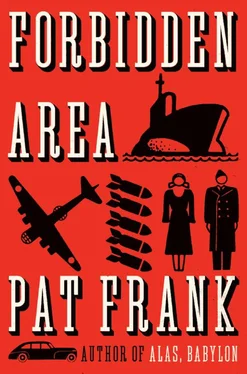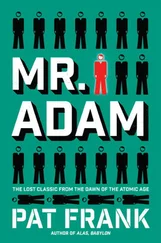She called Anne again in Baltimore and reached her this time and told her that Clint was all right. As she suspected, Anne, too, had been up most of the night, and had a call in for Hibiscus.
Katharine reached the conference room at seven-fifty and set the coffee-maker going, her natural chore as the only woman in the group. In a few minutes they began to drift in. All except Raoul looked weary. She had never seen Raoul mussed or unshaven. Jess looked as if he had slept in his uniform, and she said so.
“I did,” Jesse said. “Fell asleep in the office with my feet on the desk. Now I can hardly bend my knees.”
Simmons arrived exactly at eight. “All right,” he said, “let’s get going. I feel this is going to be a long, tough day. I’ve got something hot, but I want to save it for last because I’m sure, from your looks, that you all must have something hot too. Let’s start with AEC.” He nodded to Katharine.
“I haven’t got anything hot at all,” Katharine said. “AEC passes to Army.”
Cragey sat at her left, Jess Price at her right where his good eye was on her. Directly across sat Raoul, flanked by Batt and Felix Fromburg.
Cragey’s face was ascetic, his shoulders too thin and frail for the weight of eagles, but when he spoke of military matters it was with a scholars exactitude and authority. He told, first, of the strange withdrawals of the Russian divisions from the frontiers of Western Europe. Then he said:
“We have something out of Hong Kong. Our military attaché there has a friend in Peiping, a merchant. The merchant exports hog bristles to Hong Kong, and he also exports information. In the hog bristles. Don’t ask me how. This merchant, who, incidentally, was an acquaintance during my years in China, and whom I know to be reliable, has a mistress, a most charming girl, really; educated in India. Happen to know her too. She is a linguist, and works as an interpreter in the War Plans Staff of the Chinese People’s Army. The word from Hong Kong is that Peiping planned to invade Formosa early this month, but that the invasion has been called off. This fits in with what Steve told me last night—the massing of junks at Amoy and Tsingkiang, and then suddenly a cessation of activity.”
“I know why,” said Raoul Walback.
“In just a minute, Raoul,” said Simmons. “Let’s tap the military first. How about air, Jess?”
Jesse Price spoke of the heavy reconnaissance in the polar regions, not unprecedented in the years before the era of conciliation and hope, but now unusual.
Batt rose. He told of the thirty missing submarines, and the possible shadowing of the Forrestal. “Now I have a harder fact,” he went on. “We have just heard from our naval attaché in Stockholm. On five December a Swedish patrol vessel sighted a flotilla of twelve submarines passing out through the Skaggerak.”
Batt paused to give them time to consider this statement. Simmons demanded, “Why are we getting this so late?”
“Hard to say,” Batt said. “The Swedish kid commanding the patrol boat probably didn’t think it important. After all, Sweden is worried about the Baltic, not the Atlantic, and the Swedes see Russian subs maneuvering all the time. So he probably just turned in his sighting in a routine way when he got back to port, and it stayed routine until it got to the Navy Ministry and somebody mentioned it to our man in Stockholm. Same sort of thing happens here, you know.”
Katharine’s fingers felt cold and she looked at her hands and saw that the palms were white. Suddenly, she was afraid. It was eerie, the way in which the Russians seemed to be following their plan. It was as if, in childhood, you had scared yourself reading ghost stories which you knew were just stories, and then looked up to see a spook at the window. She started to speak, but decided it was unnecessary. Everyone else was thinking the same thing. She could read it in the stone set of their faces.
Simmons asked a question, the words tiptoeing carefully down the table. “Assuming that the submarine flotilla is headed from the Skaggerak towards our Gulf ports—as our forecast calls for it to do—how soon, Commander Batt, would they reach their target areas?”
Steve Batt leaned back in his chair, staring at the ceiling, and did his computations half aloud. “I’ll give them seventeen knots on the surface, nights, and eleven knots submerged during daylight hours, and they’ll have fifteen hours of darkness, average, each day. I’ll move them west just south of Iceland to thirty degrees, west; then due south; then west again.” His lips moved soundlessly and his eyes closed as he calculated the navigation problem. He said: “They should be in firing position by twenty-four December—certainly not later than the twenty-fifth. You understand it’s only a guess. This isn’t the chartroom in Leningrad.”
So they would know, for sure, within the week. Simmons said, “What has CIA got?”
“Hold your hats,” Raoul said. “We are presently entertaining in our Vienna office a most unusual guest. Simonov. For years he was a hatchet man for the NKVD, and later for the MVD. Pal of Beria’s, and we had expected his throat would be cut in ’fifty-three when they liquidated his chief. Simonov survived. He may have delivered Beria over to Malenkov and Khrushchev. You never can tell for sure about those things. Anyway, Simonov flew to Vienna recently on some murderous mission for Moscow and promptly came over. Said some sort of ruckus was developing in the Kremlin, and his number was up. The important thing is that he gave a reason for what’s going on in China. Seems that the Chinese were planning to hit Formosa this month, just as we heard from Colonel Cragey. They kept it secret, even from the Russians, until a few weeks ago. The Russians were furious when they found out. Simonov overheard a conversation between two of the deputy premiers and the Chinese ambassador to Moscow. The Russians told the ambassador that an outbreak of war in the Far East would spoil everything. They told him that they were withdrawing all Russian air from the area for use elsewhere, and that if the Chinese insisted on striking they could count on no help. Then one of the deputies patted the ambassador on the shoulder and said, ‘If you’ll just be patient a while longer, you’ll be able to swim to Formosa.’”
“Very interesting,” said Simmons. “It appears that the Chinese decided to be patient. In this same connection, there’s been another schism in the Russian high command. Our ambassador doesn’t know exactly what it is, as yet. For one thing, the big military boys haven’t been seen in public recently. No announced purge, understand. But the men behind the scenes, the Party men, are openly seizing executive power. It is good to keep in mind that the Russian military tradition is to defend the homeland, but the Party’s goal has always been one thing—world revolution and hegemony. This split can mean a purge, or it can be that the marshals are now engaged solely in military matters, and therefore have relinquished all their control in internal affairs.”
“It’s coming all right, isn’t it?” Raoul Walback said, more a statement than a question, and more to himself than to his colleagues.
Simmons nodded. “Yes, I’m afraid it’s coming—and very soon. I haven’t quite finished. Two weeks ago, as you know, the Russian ambassador left Washington for Moscow. The announcement was ‘routine consultations.’ He took quite a staff back with him, of rather unusual composition. Only a few were of high rank or proven diplomatic quality. The others were all assistant military attachés and obscure vice-consuls who we have reason to believe are either high in the Party, or agents of the MVD.”
“How about their ambassador to the UN?” Katharine asked. “He’s still here, isn’t he?”
Читать дальше












